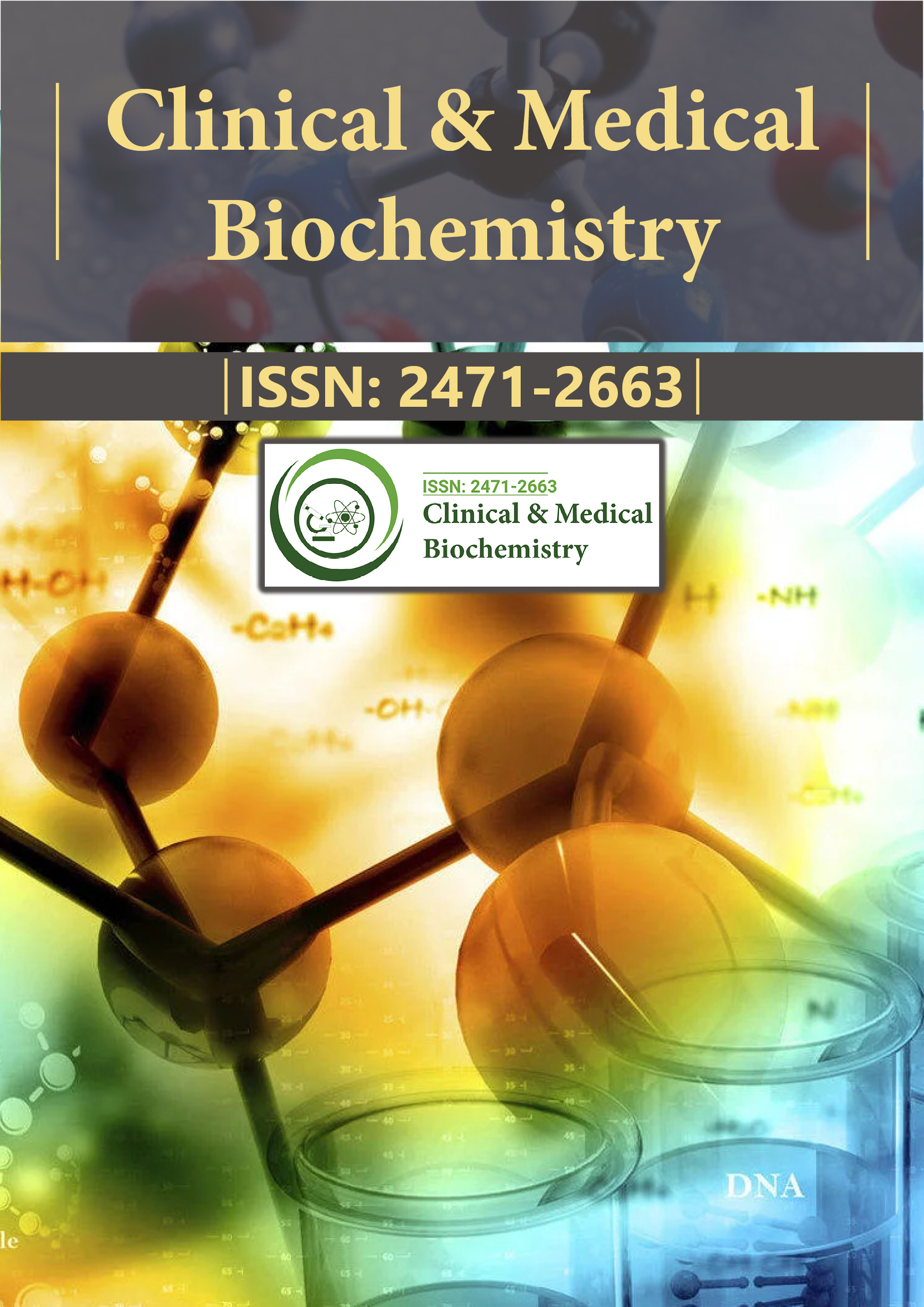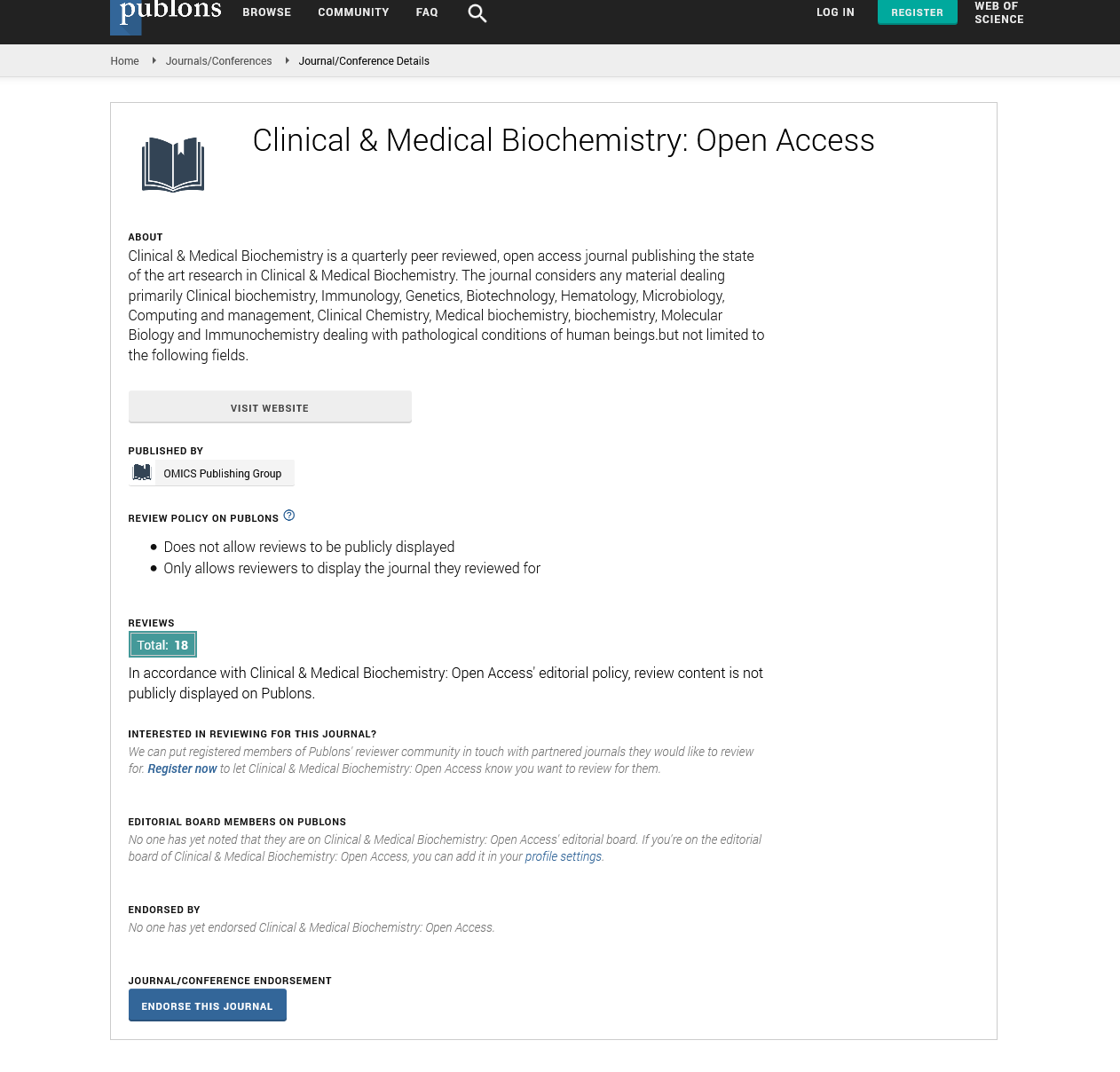Indexed In
- RefSeek
- Directory of Research Journal Indexing (DRJI)
- Hamdard University
- EBSCO A-Z
- OCLC- WorldCat
- Scholarsteer
- Publons
- Euro Pub
- Google Scholar
Useful Links
Share This Page
Journal Flyer

Open Access Journals
- Agri and Aquaculture
- Biochemistry
- Bioinformatics & Systems Biology
- Business & Management
- Chemistry
- Clinical Sciences
- Engineering
- Food & Nutrition
- General Science
- Genetics & Molecular Biology
- Immunology & Microbiology
- Medical Sciences
- Neuroscience & Psychology
- Nursing & Health Care
- Pharmaceutical Sciences
Commentary - (2025) Volume 11, Issue 2
Overview of Common Biochemical Tests and Their Importance in Medical Diagnostics Today
Bckone Koner*Received: 30-Apr-2025, Manuscript No. CMBO-25-29627; Editor assigned: 02-May-2025, Pre QC No. CMBO-25-29627; Reviewed: 16-May-2025, QC No. CMBO-25-29627; Revised: 23-May-2025, Manuscript No. CMBO-25-29627; Published: 30-May-2025, DOI: 10.35841/2471-2663.25.11.250
Description
Biochemical tests are essential analytical procedures used to detect, measure and analyze chemical substances in biological systems, particularly within the human body. These tests are crucial in clinical diagnostics, biomedical research and treatment monitoring. By evaluating the presence or concentration of specific biomolecules such as enzymes, lipids, proteins, carbohydrates and metabolites, biochemical tests help healthcare professionals assess organ function, diagnose diseases and determine the effectiveness of therapies. Their speed, accuracy and ability to detect early pathological changes make them indispensable in modern medicine.
Biochemical tests can be performed on various body fluids, including blood, urine, cerebrospinal fluid and saliva. The most commonly analyzed specimen is blood, particularly serum or plasma, which contains numerous markers reflecting the body's metabolic state. One of the most frequently conducted tests is the blood glucose test, which measures the concentration of glucose in the blood and is vital for diagnosing and monitoring diabetes mellitus. Another common test is the lipid profile, which includes total cholesterol, High-Density Lipoprotein (HDL), Low-Density Lipoprotein (LDL) and triglycerides. This test is used to assess cardiovascular risk and guide dietary and pharmacological interventions.
Liver function tests are a panel of biochemical tests that evaluate liver health and include measurements of enzymes such as Alanine Aminotransferase (ALT), Aspartate Aminotransferase (AST), Alkaline Phosphatase (ALP) and Gamma-Glutamyl Transferase (GGT), as well as bilirubin and albumin levels. Elevated enzyme levels often indicate liver inflammation or damage, while abnormal bilirubin or albumin values may suggest impaired liver function. Similarly, kidney function tests such as Blood Urea Nitrogen (BUN) and serum creatinine provide insights into renal efficiency and are used to detect acute or chronic kidney disease.
Biochemical tests also play a key role in detecting and managing metabolic disorders. For example, tests for electrolytes like sodium, potassium, calcium and chloride help monitor fluid and acid-base balance, which is critical in conditions such as dehydration, heart failure, or renal dysfunction. Thyroid function tests, including levels of Thyroid-Stimulating Hormone (TSH), Triiodothyronine (T3) and Thyroxine (T4), help evaluate thyroid gland activity, aiding in the diagnosis of hypothyroidism and hyperthyroidism. Hormonal assays, meanwhile, assess reproductive health, endocrine disorders and stress response by measuring substances such as cortisol, estrogen, progesterone and testosterone.
In addition to blood-based testing, biochemical analysis of urine provides essential clinical information. The urinalysis is a routine test that includes chemical, physical and microscopic examination of urine. It can detect abnormalities such as proteinuria, hematuria, glycosuria and ketonuria, which may point to conditions like kidney disease, urinary tract infections, diabetes, or dehydration. More advanced biochemical tests on urine may include 24-hour urine protein, creatinine clearance and microalbumin tests, particularly useful for monitoring diabetic nephropathy or assessing glomerular function.
Enzyme assays are another important category of biochemical testing. These tests evaluate the activity of specific enzymes, which can reflect organ health or the presence of certain diseases. For example, elevated levels of Creatine Kinase (CK) may indicate muscle damage, while high levels of amylase and lipase are commonly associated with pancreatitis. In cases of myocardial infarction (heart attack), cardiac markers such as troponin I and troponin T are measured to confirm heart muscle injury and guide treatment decisions. These enzyme-based tests are highly sensitive and provide critical diagnostic information within hours of symptom onset.
Another key application of biochemical tests is in the screening and diagnosis of inborn errors of metabolism, especially in newborns. These rare genetic disorders result from enzyme deficiencies that lead to abnormal metabolite accumulation. Early detection through newborn screening programs, which often include biochemical assays for substances such as phenylalanine (in phenylketonuria) or galactose (in galactosemia), allows for timely dietary interventions that can prevent serious developmental consequences. Tandem mass spectrometry and other advanced biochemical technologies have expanded the scope and accuracy of such screening efforts.
The accuracy and reliability of biochemical tests depend on proper sample collection, storage and analysis. Factors such as time of day, fasting status, medications and patient hydration can influence test results. Therefore, clinicians must interpret biochemical test outcomes in the context of the patient’s clinical history, symptoms and other diagnostic findings. Laboratories follow strict quality control measures and use automated analyzers with standardized reagents to ensure consistency and accuracy of results. Continuous technological advancements in biochemistry, including high-throughput screening, biosensors and point-of-care testing, are further improving diagnostic speed and accessibility.
The integration of biochemical tests into routine healthcare has transformed the early diagnosis and management of diseases. For instance, monitoring blood glucose and HbA1c levels in diabetic patients enables personalized treatment adjustments and helps prevent complications. Biochemical markers for cancer, such as Prostate-Specific Antigen (PSA) for prostate cancer or CA-125 for ovarian cancer, assist in screening, prognosis and response to treatment. Furthermore, therapeutic drug monitoring, which involves measuring drug levels in blood, ensures optimal dosing and minimizes toxicity for medications with narrow therapeutic windows.
Conclusion
In conclusion, biochemical tests are fundamental tools in modern clinical practice, offering precise and timely information about physiological and pathological processes in the human body. They provide invaluable assistance in diagnosis, prognosis, monitoring andresearch across a wide spectrum of medical conditions. Their application continues to expand with scientific progress, ensuring that clinicians can make well-informed decisions that improve patient outcomes and overall public health.
Citation: Koner B (2025). Overview of Common Biochemical Tests and Their Importance in Medical Diagnostics Today. Clin Med Bio Chem.11:250.
Copyright: © 2025 Koner B. This is an open-access article distributed under the terms of the Creative Commons Attribution License, which permits unrestricted use, distribution andreproduction in any medium, provided the original author and source are credited.

